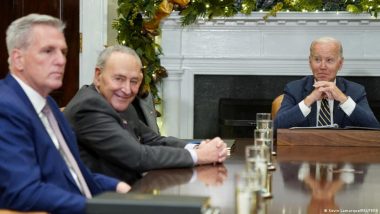The US president vowed that a US debt default would be avoided, as a deadline for agreeing on more borrowing loomed. However, Biden acknowledged remaining differences with Republicans.US President Joe Biden said on Thursday that a US debt default would be avoided, hailing "productive" talks with Republican Speaker Kevin McCarthy ahead of a looming deadline to agree on more borrowing.
Biden's statements to reporters on Thursday came a week before an estimated June 1 deadline at which point the Treasury Department and Federal Reserve say they would be unlikely to continue covering for the nominal inability to borrow in other ways, as they have in the first months of the year during the standoff.
Also Read | Tax Exemption Limit on Leave Encashment Increased to Rs 25 Lakh for Non-Government Salaried Employees.
Biden told reporters on Thursday that Republicans were pushing for steep cuts but that he was confident of a bipartisan agreement.
"The only way to move forward is with a bipartisan agreement and I believe we will come to an agreement [that] allows us to move forward and protects the hardworking Americans of this country," Biden said.
He argued that he and McCarthy "have a very different view of who should bear the burden of additional efforts to get our fiscal house in order," saying McCarthy wanted middle and working class people to shoulder the load while he would also seek to pass costs on to the wealthy.
What's the issue here? How long is left?
The Republicans, who enjoy a small Congressional majority, have yet to approve plans to raise the government's $31.4 trillion (roughly €29 trillion) debt ceiling. They want to secure cuts to Biden's aggressive spending plans, not least his flagship Inflation Reduction Act program.
Raising the debt ceiling is supposed to be an almost automatic annual practice — almost all US governments borrow at least some money in any given year — but on several occasions in recent years an opposition-led Congress has used the requirement to try to secure concessions on spending from the White House.
For the first few months of the standoff, President Joe Biden flatly refused talks with McCarthy, despite many observers predicting they would prove inevitable eventually.
Although the financial arms of the US government had been reticent of putting a firm date on when they could no longer manage to effectively cook the books while unable to take out new debt on paper, both the Fed and the Treasury had pointed to June in the past.
However, doubts persist as to whether that deadline is set in stone, not least given the Treasury Department announcing on Thursday that wit would sell $119 billion worth of debt on June 1, something it might do to try to make up for unavailable revenue sources.
Should the US be deemed to have technically defaulted on its debt, that could have serious implications for future borrowing costs for the country. But that is liable to pose a greater risk to the wider global economy, with ripple effects that could hit poorer countries much harder.
rmt/msh (AFP, Reuters)
(The above story first appeared on LatestLY on May 26, 2023 01:40 AM IST. For more news and updates on politics, world, sports, entertainment and lifestyle, log on to our website latestly.com).













 Quickly
Quickly





















